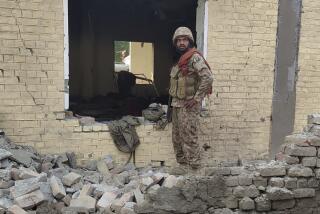Suicide bombing kills 17 at Afghan bathhouse
- Share via
Reporting from Kabul, Afghanistan — A suicide bomber blew himself up Friday at a public bathhouse in southern Afghanistan that was filled with men washing themselves before the main prayers of the Muslim week. At least 17 were killed and 23 injured, provincial officials said.
The Taliban claimed responsibility for the attack in Spin Boldak, in Kandahar province. The district, a main crossing point to and from Pakistan, is a longtime nexus of drug and weapons smuggling.
A Taliban spokesman, Qari Yousaf Ahmadi, claimed the explosion had killed the deputy commander of the province’s border police force. Abdul Razak, the border police commander, said a lieutenant colonel on the force was killed, but that the man was not his deputy. Two other police were among the injured, he said.
The attack appeared to be a direct challenge to the authority of Razak, who is the main power broker in that part of the province and has close ties with the U.S. military despite a record of corruption and human rights abuses. Over the past year, Razak has managed to render Spin Boldak relatively secure by bringing militias under his control into the border police.
The bombing showed, however, that the insurgents remain capable of large-scale attacks despite an intense Western military campaign in Kandahar province, spearheaded by U.S. forces. NATO has claimed success in driving insurgents out of traditional strongholds close to Kandahar city, the south’s main population hub and the Taliban movement’s spiritual home.
President Hamid Karzai condemned Friday’s attack, calling it un-Islamic. Although mosques have sometimes been targeted by suicide bombers, an assault on men making their pre-prayer ablutions was shocking to many Afghans. Nearly all the dead and wounded were civilians.
Also Friday, three Western service members were killed, one in an explosion in southern Afghanistan, and two in insurgent attacks in the east, the NATO force said. Their nationalities were not disclosed, but most troops in those areas are Americans.
More to Read
Sign up for Essential California
The most important California stories and recommendations in your inbox every morning.
You may occasionally receive promotional content from the Los Angeles Times.










